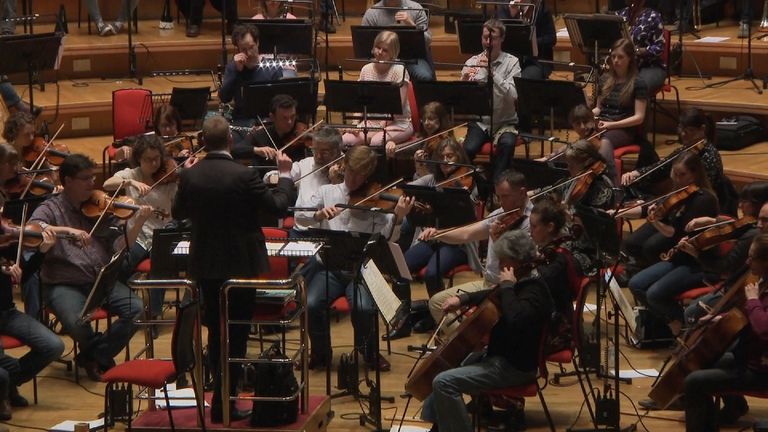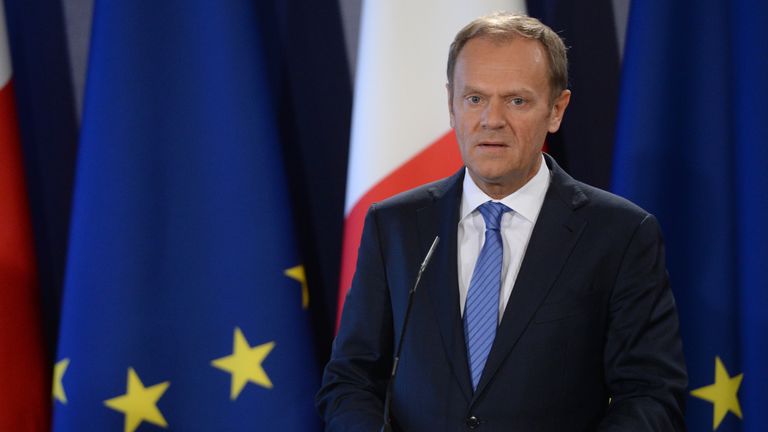Why musicians are making a song and a dance about Brexit
Orchestras can move freely around the EU without tariffs and piles of forms to fill in - but all that could be about to change.
Saturday 1 April 2017 03:20, UK
Hans Christian Andersen once said: "Where words fail, music speaks."
On that basis, perhaps Brexit Secretary David Davis and Michel Barnier, the EU's chief negotiator, might be cracking out the Beethoven quite frequently during their discussions over the next two years.
Yet even the world of Mozart, Mendelssohn and MussorgAG百家乐在线官网 doesn't escape the shadow of the Brexit talks.
It seems to me that aside from football, the world of orchestras and classical music might be the single most European business (for it is a business) that exists.
For decades, the British classical music scene has become continental in its purview, not just British. It recruits conductors, players and staff from Liverpool to Linz.
So where better to take the Brexit Lewis Lorry on day three of its inaugural week to Symphony Hall in Birmingham - the home of the City of Birmingham Symphony Orchestra (CBSO).
Not only one of the finest orchestras in the country and continent, the Symphony Hall building itself perfect sums up the British ambivalence and contradiction towards the EU.
It's a building where I watched Theresa May, newly installed as prime minister, set out her first thoughts on how she wanted Brexit to proceed.
It's also a building that I watched being built as a young kid in Birmingham, entirely as a result of European Union funding (Westminster refused).
And now as Brexit proceeds, the permanent residents inside are nervous.
Stephen Maddock, the chief executive of the CBSO, tells me that the classical music world is especially ill-equipped to ride the rapids of our European exit: "We're in such an interconnected world in classical music. We don't recognise frontiers really, we play European music and we play in a European arena."
We were told after all that one of the great benefits of leaving the EU would be a release from the deadening hand of the Brussels bureaucracy. This may well be true for some industries but for the orchestral world they're surveying a landscape which could leave them with far more forms to fill.
Consider that right now an orchestra like the CBSO can take all of their British and European players across virtually the whole continent without a single form being filled.
Likewise they can move all of their instruments, at least one for each player, similarly without impediment.
If a player is ill, they can call upon another without delay and the need for an emergency visa.
Double-accounting tax arrangements exist so there is no need for extra PAYE requirements or tax headaches.
There are no regulations with regards to ivory and other specialist equipment (as there is with the US when taking violin bows which are subject to special treatment).
And if you want to get a guest conductor for a week or so from the EU, you can employ one without the need of a short-term visa - and you don't need to pay any extra tariffs on selling concerts across the whole continent.
Now imagine the reverse. Visas for players, carnets (special export documents) for every instrument an orchestra takes on tour and emergency visas. It all adds up to one major headache (albeit a boon for accountants and pen pushers).
The fear is that the UK becomes much less attractive for foreign orchestras to tour in and spend money - why go to London or Birmingham with all the headaches when you can go to Paris or Barcelona?
As one orchestra official said to me: "There are almost no tours in Switzerland. There's a reason for that - no one can be bothered with the non-EU paperwork."
Now, plenty of tours go to the US and there are lots of non-EU players tooting their horns and plonking their keys across the UK. But the point is that without a special deal for music, the UK will become much less attractive as a destination for arts investment and the best talent. We might not hear about it much, but the arts represents over 10% of UK GDP.
But everyone wants a special deal. If every industry gets one, we might wonder why we left in the first place. And after all, Brexit means Brexit.
As Beethoven said in the EU's anthem Ode To Joy: "Alle Menschen warden Bruder" - or "All men will be brothers."
A nice idea. It might do for someone to play it when David Davis and Michel Barnier next meet.






